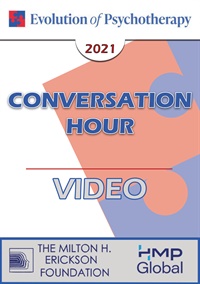
- Average Rating:
- Not yet rated
- Topic Areas:
- Addiction | Conversation Hours
- Categories:
- Evolution of Psychotherapy | Evolution of Psychotherapy 2021
- Faculty:
- Claudia Black, PhD
- Course Levels:
- Master Degree or Higher in Health-Related Field
- Duration:
- 1 hour
- Format:
- Audio and Video
- Original Program Date:
- Dec 04, 2021
- Short Description:
- The acronym ACA or ACoA has been a part of the therapy community for several decades now. As the pioneer in the framework for its meaning and influence in the recovery field , Claudia Black will discuss her history with the meaning and the value this terms offers the client. She will also offer a framework for healing the family of origin issues that often contribute to depression, anxiety, relationship conflict and addiction relapse.
- Price:
- $59.00 - Base Price
Tags: Addiction
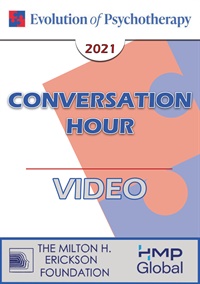
- Average Rating:
- Not yet rated
- Topic Areas:
- Conversation Hours | History of Psychotherapy | Psychotherapy
- Categories:
- Evolution of Psychotherapy | Evolution of Psychotherapy 2021
- Faculty:
- Jeffrey Zeig, PhD
- Course Levels:
- Master Degree or Higher in Health-Related Field
- Duration:
- 1 hour
- Format:
- Audio and Video
- Original Program Date:
- Dec 04, 2021
- Short Description:
- Dr Zeig will discuss and answer questions about some of the psychotherapy masters he has encountered, including Viktor Frankl, Milton Erickson and Virginia Satir.
- Price:
- $59.00 - Base Price

- Average Rating:
- Not yet rated
- Topic Areas:
- Topical Panels
- Categories:
- Evolution of Psychotherapy | Evolution of Psychotherapy 2021
- Faculty:
- Steven Hayes, PhD | Michael Yapko, PhD | Donald Meichenbaum, PhD
- Course Levels:
- Master Degree or Higher in Health-Related Field
- Duration:
- 1 hour
- Format:
- Audio and Video
- Original Program Date:
- Dec 04, 2021
- Short Description:
- Therapy happens in life, not just in the consulting room. Assignments facilitate treatment goals.
- Price:
- $59.00 - Base Price

- Average Rating:
- Not yet rated
- Topic Areas:
- Topical Panels
- Categories:
- Evolution of Psychotherapy | Evolution of Psychotherapy 2021
- Faculty:
- Ellyn Bader, PhD | Harville Hendrix, PhD | Helen LaKelly Hunt, PhD
- Course Levels:
- Master Degree or Higher in Health-Related Field
- Duration:
- 1 hour
- Format:
- Audio and Video
- Original Program Date:
- Dec 04, 2021
- Short Description:
- The underlying principles of couples therapy differ from individual therapy for both assessment and treatment. The panelist will discuss and contrast their models.
- Price:
- $59.00 - Base Price
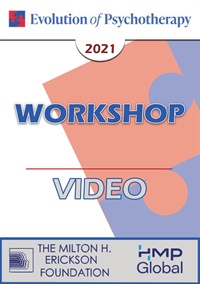
- Average Rating:
- Not yet rated
- Topic Areas:
- Workshops
- Categories:
- Evolution of Psychotherapy | Evolution of Psychotherapy 2021
- Faculty:
- Stephen Gilligan, PhD
- Course Levels:
- Master Degree or Higher in Health-Related Field
- Duration:
- 2 hours
- Format:
- Audio and Video
- Original Program Date:
- Dec 04, 2021
- Short Description:
- Verbal conversations alone cannot produce sustainable change: somatic intelligence must be an integral part of sustainable change; verbal conversations are not sufficient. This workshop will experientially explore how to creatively use the related methods of Gendlen's "felt sense" and Gilligan's "relational trance".
- Price:
- $59.00 - Base Price
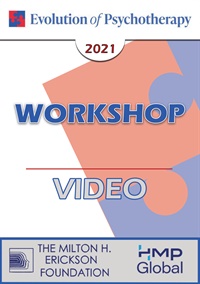
- Average Rating:
- Not yet rated
- Topic Areas:
- Workshops
- Categories:
- Evolution of Psychotherapy | Evolution of Psychotherapy 2021
- Faculty:
- Sue Johnson, EdD
- Course Levels:
- Master Degree or Higher in Health-Related Field
- Duration:
- 2 hours
- Format:
- Audio and Video
- Original Program Date:
- Dec 04, 2021
- Short Description:
- This workshop will teach the application of the EFT Tango - and show its use across three modalities - Individual, couple and family therapy. How the Tango process impacts depression and anxiety will be explicated. Clinical sessions will be viewed and experiential exercises offered.
- Price:
- $59.00 - Base Price
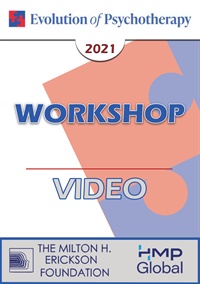
- Average Rating:
- Not yet rated
- Topic Areas:
- Workshops
- Categories:
- Evolution of Psychotherapy | Evolution of Psychotherapy 2021
- Faculty:
- Nancy McWilliams
- Course Levels:
- Master Degree or Higher in Health-Related Field
- Duration:
- 2 hour
- Format:
- Audio and Video
- Original Program Date:
- Dec 04, 2021
- Short Description:
- Dr. McWilliams will review ten different psychological lenses through which individual differences have been viewed (temperament, attachment style, observed clinical pattern, defensive structure, affective organization, implicit cognition, motivational tendencies, individual and cultural location on the self-definition versus self-in-relation polarity, central relational theme, level of severity of problem), emphasizing with clinical vignettes the practical value of appreciating each perspective. Intended to be directly relevant to participants' clinical work irrespective of their theoretical orientation or level of experience, this workshop welcomes case material and collaborative problem-solving.
- Price:
- $59.00 - Base Price
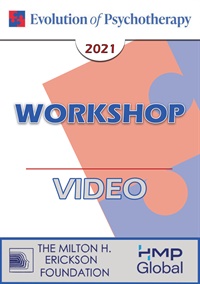
- Average Rating:
- Not yet rated
- Topic Areas:
- Workshops
- Categories:
- Evolution of Psychotherapy | Evolution of Psychotherapy 2021
- Faculty:
- Ellyn Bader, PhD
- Course Levels:
- Master Degree or Higher in Health-Related Field
- Duration:
- 2 hours
- Format:
- Audio and Video
- Original Program Date:
- Dec 03, 2021
- Short Description:
- Clients coming for Couples Therapy have often been impacted by early developmental trauma, systemic or intergenerational trauma, or acute interpersonal trauma. Partners with early developmental trauma or acute trauma at young ages are complex to work with and take patience, and persistence from the therapist to recognize moments of exposure and self-expression in order to develop a stronger sense of self. Yet, couples therapy can be a very powerful form of therapy for alleviating shame and developing a much stronger and more integrated sense of self.
- Price:
- $59.00 - Base Price
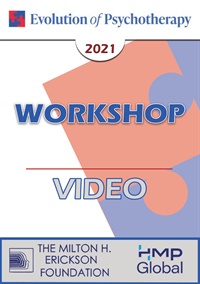
- Average Rating:
- Not yet rated
- Topic Areas:
- Workshops
- Categories:
- Evolution of Psychotherapy | Evolution of Psychotherapy 2021
- Faculty:
- Judith Beck, PhD
- Course Levels:
- Master Degree or Higher in Health-Related Field
- Duration:
- 2 hour
- Format:
- Audio and Video
- Original Program Date:
- Dec 03, 2021
- Short Description:
- "This workshop deals with the challenges of treating clients with personality disorders, clients who, for example, fail to engage in treatment, miss sessions, feel hopeless and stuck, become angry in session, engage in self-harm, use substances, blame others, avoid homework, experience continual crises, and so on. Special attention will be paid to how to help clients get out of the ""personality disorder mode"" and into the ""adaptive mode."" Through discussion and demonstration roleplays, we'll cover identifying clients' values and aspirations, creating positive experiences and helping clients draw positive conclusions about them, engaging clients in treatment, repairing ruptures in the therapeutic relationship, applying lessons learned from the therapeutic relationship to relationships outside of therapy, learning and using adaptive coping strategies, and developing positive (i.e., more realistic) beliefs about themselves, other people, their worlds, and the future.
- Price:
- $59.00 - Base Price
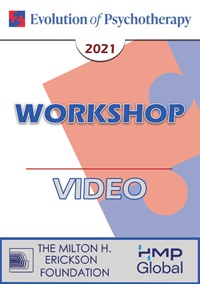
- Average Rating:
- Not yet rated
- Topic Areas:
- Workshops
- Categories:
- Evolution of Psychotherapy | Evolution of Psychotherapy 2021
- Faculty:
- Robert Dilts, BA
- Course Levels:
- Master Degree or Higher in Health-Related Field
- Duration:
- 2 hours
- Format:
- Audio and Video
- Original Program Date:
- Dec 03, 2021
- Short Description:
- Carl Jung pointed out that "Everything that irritates us about others can lead us to a better understanding of ourselves." Dealing effectively with challenging relationships and interactions requires the ability to perceive and integrate a number of different perspectives, or "Perceptual Positions." The Meta Mirror Format acknowledge the fact that, typically, clients have the most difficulty communicating with others who mirror back to them what they have difficulty relating to in themselves. This workshop will show that when clients can be helped to shift perspectives and see how the problem they are experiencing with respect to the other person is really a reflection of their relation with themselves, it can bring both significant insight and new possibilities.
- Price:
- $59.00 - Base Price
Please wait ...

